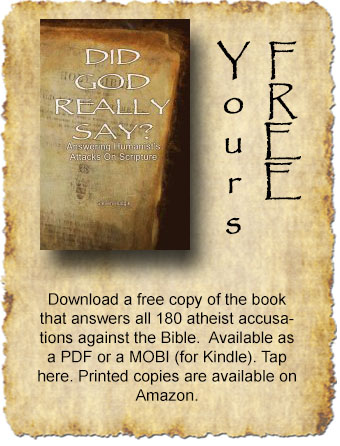Atheist's Attacks
Answering Humanist's Accusations Against the Bible


Is Science Superior to the Bible?
Does the Bible teach the earth is stationary and at the center of the universe?
THE HUMANIST'S CLAIM: Other passages demonstrating that the earth remains stationary include Psalm 93:1 (“The world is [e]stablished, that it cannot be moved.”); I Chronicles 16:30 (“[T]he world also shall be stable, that it be not moved.”); and Psalm 104:5 (The Lord “laid the foundations of the earth, that it should not be removed forever.”).
Because of Galileo’s support for the Copernican doctrine, the Inquisition threatened him with torture, forced him to recant, and subjected him to imprisonment. Additionally, for nearly 200 years the Catholic Church’s Index of Forbidden Books condemned all writings that affirmed the double motion of the earth. [Again referencing the discredited Andrew White.]
Protestants weren’t much better. For generations the major branches of Protestantism – Lutheran, Calvinist, and Anglican – denounced the Copernican doctrine as contrary to scripture.
Let us look at each of the referenced verses starting with Psalm 93:1-2. Verse 2 is included to provide context:
Psalm 93:1-2 (verse 2 included to provide context):
1 - The Lord reigns, He is clothed with majesty;
The Lord has clothed and girded Himself with strength;
Indeed, the world is firmly established, it will not be moved.
2 - Your throne is established from of old;
You are from everlasting.
The topic of these verses is not science. Psalm 93 celebrates God's sovereign kingship over the world— meaning those living on the earth (people), not the earth itself. The point of this verse (and Psalm) is that God is in control and His plan for humanity will be accomplished.
For example, in Psalm 9:8 the same Hebrew word translated as "world" is used:
And He will judge the world in righteousness;
He will execute judgment for the peoples with equity.
The above verse is about judgment. Does God judge the physical planet (the dirt, rocks, etc.), or does He judge people? In other words, does our planet disobey God and need to be judged, or is it people who disobey God? It is obvious; the word "world" refers to people. Psalm 93, referenced by the humanists, is not about the planet, it is about people, and God's sovereign rule over people.
1 Chronicles 16:30 (verses 29 and 31 included for context):
29 - Ascribe to the Lord the glory due His name;
Bring an offering, and come before Him;
Worship the Lord in holy array.
30 - Tremble before Him, all the earth;
Indeed, the world is firmly established, it will not be moved.
31 - Let the heavens be glad, and let the earth rejoice;
And let them say among the nations, “The Lord reigns.”
I have only included a small part of the context, but even from that you can see this Psalm (a Psalm of thanksgiving included within 1st Chronicles) is about people thanking God and proclaiming God's glory. Why would there be a line about the earth being stationary at the center of the universe, totally out of context in the middle of a section of scripture about people, all the people in the world (all the earth) praising and glorifying God? That makes no sense at all.
Once again, in this verse, the Hebrew word translated as "world" is "tebel," the same word used in Psalm 93 and Psalm 9 to refer to all people.
Psalm 104:5
The last verse referenced in the humanist’s accusation is Psalm 104:5.
He established the earth upon its foundations,
So that it will not totter forever and ever.
This Psalm is referring to the book of Job, and specifically Job 38:4 (verses 3 & 5 are included for context):
3 - “Now gird up your loins like a man,
And I will ask you, and you instruct Me!
4 - “Where were you when I laid the foundation of the earth?
Tell Me, if you have understanding,
5 - Who set its measurements? Since you know.
Or who stretched the line on it?

The New International Commentary1 on the Old Testament provides some helpful information about these verses:
Job is being asked to make known his knowledge of the initial stages of the creation of the world as though he were the primordial man who had witnessed the laying of the earth's foundation.
God is talking about FULLY KNOWING the inner structure of the created order. Job is being asked to make known his knowledge of the initial stages of the creation of the world as though he were the primordial man who had witnessed the laying of the earth's foundation1. What God is talking about is FULLY KNOWING the inner structure of the created order.
What is does "inner structure of the created order" mean? These are the underlying things that God created first, and on which the entire universe is based. They include God creating time and space. They also include what we refer to as the Laws of Nature, the Laws of Logic, and other foundational "laws." You might call these “laws” the principles God established for how His universe would run. They are the foundation on which the earth was established when it was created.
Psalm 104 says nothing about the earth not physically moving through space. It says nothing about the earth being at the center of the universe. To use any of these verses to support geocentricity is a misuse of scripture.
Galileo
The humanist now makes a claim that starts with, “Because of Galileo’s support for the Copernican doctrine...” (see the quote at the beginning of the chapter). I covered this in the previous chapter. This is a common myth that has no basis in reality. Let us go to a pro-evolution web site to see what they have to say about the Galileo controversy:
No it wasn’t science versus religion... Galileo did not heroically lead a scientific consensus with powerful and unambiguous empirical evidence against ecclesiastical resistance. Church leaders did not “try to suppress them.
Nor did Galileo face any kind of unified opposition from the Roman Catholic Church. That is another myth. There were many in the church who had no problem with Galileo pursuing his ideas, and the Pope had been a benefactor of Galileo before...
The above is quoted from: www.evolutionnews.org
Yes, Galileo was brought before the inquisition in April of 1633 to face charges of heresy for the way he advocated in favor of Copernicus. For example, he called some parts of the Bible “false if one goes by the literal meaning of the words. ” That is a serious problem. In the end he plead guilty in order to get a lighter sentence and was put under permanent house arrest by the Pope. However, overall this was not about science. The “Galileo affair” was the result of Galileo’s arrogance and pride, and the politics of Pope Urban VIII.
When it comes to geocentricity, a lot of false “history” has been written, even contaminating sources that are usually considered reliable. At times it can take some digging to get to the truth.
For example, Copernicus published his “On the Revolutions of the Heavenly Spheres” in 1543. It is commonly reported that 57 years later, in the year 1600 Giordano Bruno was the first to be burned at the stake for supporting the Copernican theory. However, the actual issue was Bruno promoting a Neo-Platonist Hermeticism that had similarities to Gnosticism. He had major doctrinal problems, not scientific ones. In addition, his personality was not known for building good relationships. He was known as a “mean cuss” who made enemies of whomever he met. He went through a seven-year trial and was burned at the stake for his doctrinal and theological errors, such as believing Christ was not God, not for his supposed support of Copernicus.
Galileo’s trial is also tangled in multiple webs of historical myth and misdirection, much of it promulgated in the 19th century in order to delegitimize Christianity.
Galileo’s trial is not an example of religion opposing science. Ac-cording to Professor Santillana, “… a major part of the Church in-tellectuals were on the side of Galileo, while the clearest opposition to him came from secular ideas.” Rather, it is a sorry tale of human pride and the protection of self-interest. As argued by Professor Thomas Schirrmacher, “Galileo was the victim of his own arro-gance, the envy of his colleagues and the politics of Pope Urban VIII.” Indeed, the extent to which the affair was motivated by politi-cal rather than religious concerns is made clear by a statement by Grienberger, one of the leading church astronomers of the time. Had Galileo behaved reasonably, he said, “he would have stood in renown before the world, he would have been spared all his misfor-tunes and he could have written what he pleased about everything, even about the motion of the earth.”
The above is quoted from: Dominic Statham, “The Truth About the Galileo Affair"
The Humanists Claim: Protestants were not much better
This certainly was true. Possibly, even more so than Catholics, major Protestant leaders resisted a heliocentric solar system. However, that does not change what the Bible teaches. They were wrong, and their belief in a geocentric universe was wrong. Anyone can be wrong, no matter how famous they are, or how accurate and correct they are in other areas.
This is also true in science. Scientists believed the geocentric model of the universe proposed by Aristotle (384-322 B.C.) and refined by Claudius Ptolemy (A.D. 90–168) up until the time of Copernicus in the 16th century... and even for centuries after that. Scientists fiercely fought the Copernican heliocentric model until overwhelmed with evidence.
Conclusion: TThe Bible verses the humanists reference are not about geocentricity. There is nothing in the Bible that supports geocentrisim. This is a strawman argument.
NEXT: humanist claim the Bible supports: A Flat Earth Resting on Pillars
The Bible supports the primitive notion of a flat earth. In the sixth century, a Christian monk named Cosmas wrote a book, titled Topographia Christiana, describing the structure of the physical world. Basing his views on the Bible, Cosmas said the earth is flat and surrounded by four seas.
The prophecy at Revelation 1:7 was a basis for his conclusion. It states that when Christ returns, “every eye shall see him.” Cosmas reasoned that if the earth were round, people on the other side would not see Christ’s second coming.
Another strawman from the humanists, who are continuing to misrepresent what the Bible teaches.
BTW, by using terms such as "primitive" the humanist is using a propaganda technique called "demonizing the enemy." It involves associating your opposition with a people group (primitive in this case) that brings up negative images. Don't fall for it. It's an attempt to get you to change your mind, without any reasonable reasons for changing your mind. We'll take a look at this one on the next page... click here.
[1] - New International Commentary on the Old Testament, The Book of Job, John E. Hartley, Eerdman's, 1988, pages 494 & 495
THE WIDE OR
NARROW WAY?

Most people choose the wide road. It's the way everyone else is going. It's wide and it's an easy road, so it must be the right road. But it's the wrong way!
Enter through the narrow gate; for the gate is wide and the way is broad that leads to destruction, and there are many who enter through it. For the gate is small and the way is narrow that leads to life, and there are few who find it. - Matthew 7:13
The wide road, and wide gate is our choice based what feels good. But our feelings (our heart) are deceptive.
The heart is more deceitful than all else and is desperately sick; - Jeremiah 17:9
Christianity... meaning belief in Jesus Christ... is not a blind faith driven by emotions. It is an informed faith, based on historical facts and truth.
The truth is that we are law breakers (sinners) in need of a Savior from the just wrath of God. That Savior is Jesus Christ.
Trusting Jesus is not the easy way. It is the narrow road, through a narrow gate, and it can be difficult at times. But it is the right way to go. And it is the only way to have eternal life in Christ Jesus.
Trust Jesus. Believe in the Lord Jesus, and you will be saved. - Acts 16:31
